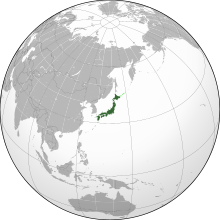LGBT rights in Japan
| LGBT rights in Japan | |
|---|---|

|
|
| Same-sex sexual activity legal? | Legal |
| Gender identity/expression | Change of legal sex allowed since 2003, following sex reassignment surgery |
| Military service | Yes |
| Discrimination protections | Sexual orientation protected in some cities, though not nationally |
| Family rights | |
| Recognition of relationships |
No recognition of same-sex relationships |
Lesbian, gay, bisexual, transgender (LGBT) persons in Japan may face legal challenges not experienced by non-LGBT persons. Same-sex sexual activity was legalized in 1880 after the installation of the Napoleonic Code and the age of consent is currently equalized. Same-sex couples and households headed by same-sex couples are ineligible for the legal protections available to opposite-sex couples. Japanese culture and major religions originated in and imported to Japan do not have a history of hostility towards homosexuality, and a majority of Japanese citizens are reportedly in favor of accepting homosexuality, with a recent poll indicating that 54 percent agreed that homosexuality should be accepted by society whilst 36 percent disagreed, with a large age gap. Although many political parties have not openly supported or opposed LGBT rights, there are several openly LGBT politicians joined in office. A law allowing transgender individuals to change their legal gender post-sex reassignment surgery was passed in 2002. Discrimination on the basis of sexual orientation is banned in certain cities.
The age of consent in Japan is 13 years old under the Japanese national criminal law code. However, all municipalities and prefectures have their own particular laws such as Tokyo's "Youth Protection Law" which prohibit adults from having sex with youths who are under 17 years old. As an added note, even though the age of consent in Japan can be 13, the age of majority is 20 for voting. The age of adulthood is considered 20 and driving age is 18. Japan's "Prostitution Prevention Act" (1958) only prohibits actual sexual intercourse (or sex controlled by organized crime). That law defines as "true" sexual conduct between men and women, and not to "imitation" between same-sex persons, so homosexual prostitution is not prohibited directly.
There are no explicit religious prohibitions against homosexuality in the traditional religion of Japan, Shintoism, or in the imported religions of Buddhism (but see Buddhism and sexual orientation) or Confucianism. Sodomy was first criminalized in Japan in 1872, in the early Meiji era, to comply with the newly introduced beliefs of Western culture and Qing legal codes. But this provision was repealed only seven years later by the Penal Code of 1880 in accordance with the Napoleonic Code. Since then, Japan has had no laws against homosexuality. Thus, sex among consenting adults, in private, regardless of sexual orientation and/or gender, is legal under Japanese law.
...
Wikipedia
